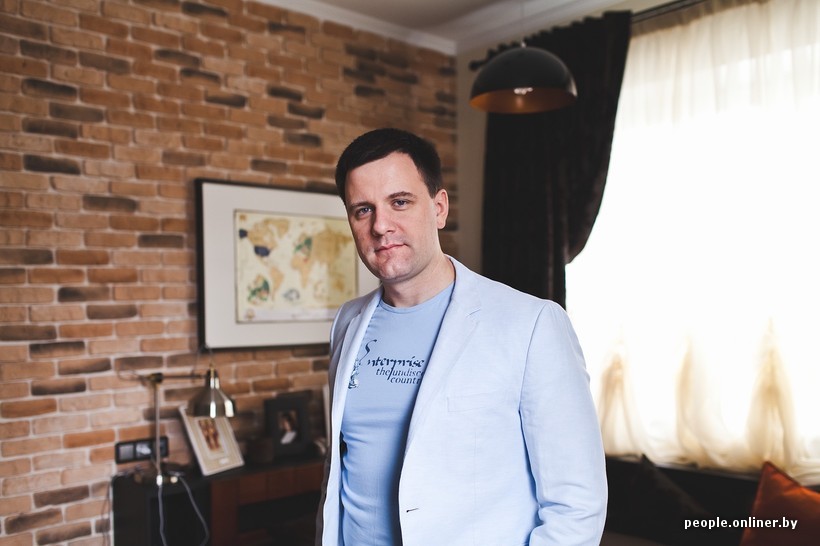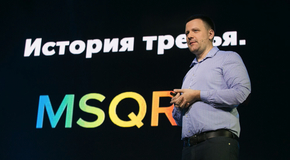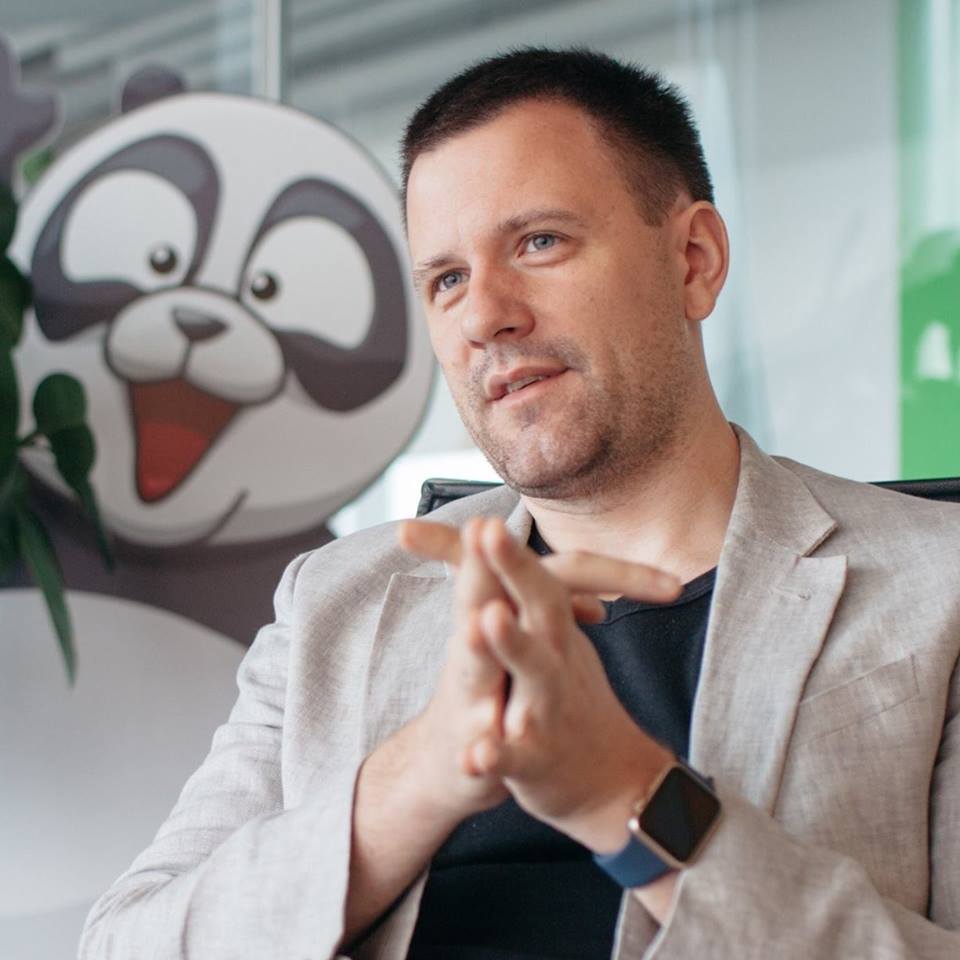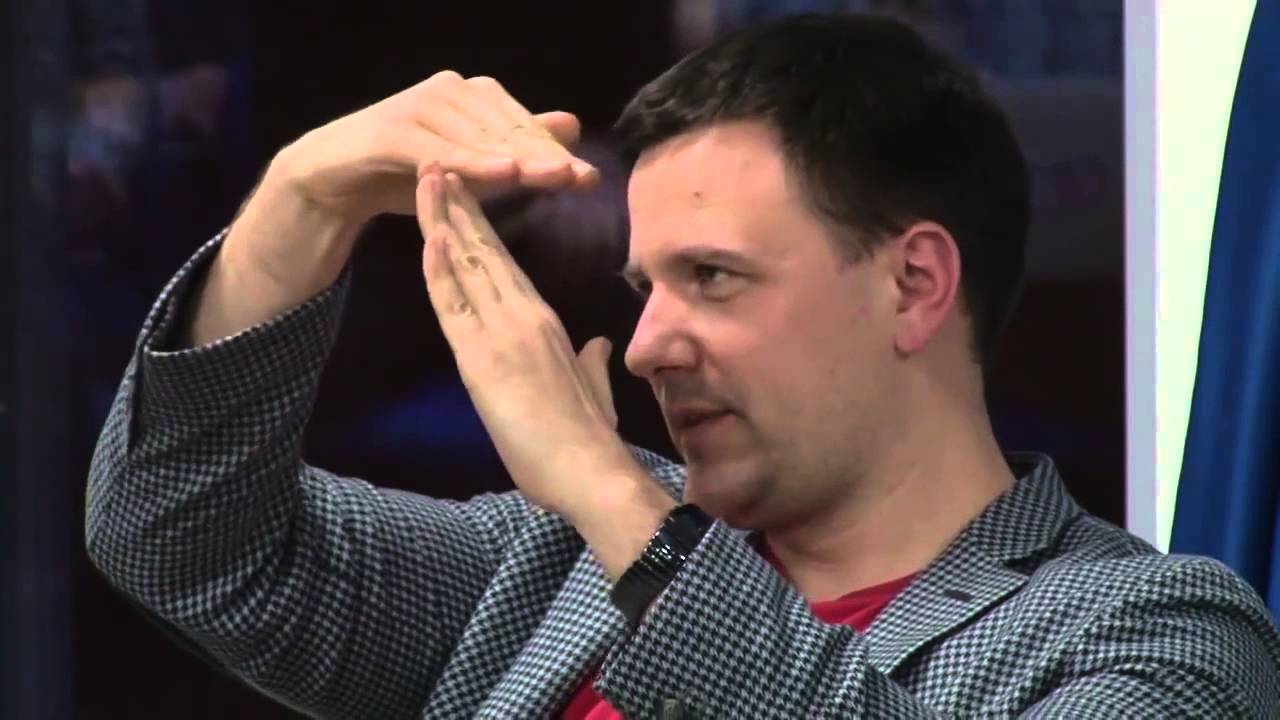Yuriy Gursky, Vice President of New Products at Mail.ru Group, about his own projects: Maps.me, MSQRD and Prisma

Yuri Gursky is a person about whom much is written today. The representative of a few Belarusian entrepreneurs, now vice president of Mail.ru Group and the person partially responsible for the success of MSQRD.
In a previous interview, Yuri said that he considers himself primarily a specialist in the field of B2C-mobile solutions, and for the previous 15 years he had to put up with the inefficiency of spending his own time.
Yuri took the time to chat with us and answer, if not all, at least some of the questions.
What is happening in your life now and where will all this lead in the next 2-3 years?
It is now clearly visible that what I have been waiting for many years is happening. I was lucky to be at the beginning of the mobile revolution and make money fast enough. But since then (since 2012) everything has been, in principle, rotten. You can always create good products, taking advantage of deep technological trends, technological changes. In conditions of stagnation, incredible efforts must be made for this.
But I see that for three months now a new revolution has begun. And I'm going to concentrate on this revolution. This is a revolution of artificial intelligence. Several trends coincided, and now artificial intelligence is taking off like a rocket. Therefore, now in terms of investments, either AI technologies or those that produce “fuel” for artificial intelligence and are capable of generating a large amount of data are interesting. I am sure that within a year or two the data will become more important than money, more expensive than money and will be actively bought up.
Do you already have any specific products, projects with which you work, in which you participate?
Now I have several projects in the state of signing contracts.
Later, Yuri announced that he is a mentor in the Prisma project, developed by Alexei Moiseenko:
Prisma is the first project I supported because of the idea of using AI in a mass product. The growth is just fantastic right now - five times faster than MSQRD. A million users in 4 days came at all without advertising and PR.
There is a question related to Mail.ru Group. You, if I understand everything correctly, for a long time remained a person who works in small and dynamically developing startups. Until recently, it was just a small or medium-sized near-computer or Internet business. Now you occupy one of the leading positions in the largest IT holding in Russia. In a previous interview, you say that you are interested in what you like, but at the same time you continue to work with small companies.
Does any startup need to turn into Mail.ru Group at some stage in its life? Does Mail.ru Group itself do not want to become a startup? Is she comfortable in the conditions in which she exists today?
To begin with, Mail.ru Group is not what they think of it. This is not a classic corporation in its structure, but a holding, where each business is relatively independent. There are very few integrating departments - and then, they are mainly providing. VKontakte lives as a separate business. "Classmates" - separately, Maps.me - too, and so on.
Therefore, I would not say that I see any differences for myself. I do not do huge projects. I deal with such points, which for the company are, one might say, internal startups. I, by and large, are very little affected by the size of Mail.ru, although they provide quite a lot of opportunities. And in general, I can’t say that I am faced with some terrible bureaucracy. Maybe this was due to the fact that I initially took such a position ... But the path from an idea to a decision is completely different than in Gazprom or Rosneft.
For example, recently we made integration - not at the level of companies, however, but at the level of technology - and made a decision in three days for a fairly large amount. And this decision was actually made by one and a half people. Therefore, if we have a desire, we do it quickly.
If we have no desire, we can bury it in a bureaucracy. Often, some managers lack the will to immediately say no, or they do not want to spoil their relationship with anyone. But in general, to make a decision, I need to talk to one or two people at the very top. And this is where the whole story ends. Therefore, it annoys me quite a bit.
I have run companies in hundreds of people. But this does not give me much pleasure, because I have very little ambition for power, and any power gives rise to a lot of responsibility for people. If you do not like it, it creates a lot of stress.
I survived all this and try to minimize it for myself. There are people who are pleased that they have fifteen hundred people in subjection. I tried to ensure that I did not have a single person in subjection, but still sometimes I have to lead.
Let's go back one step chronologically. You ended up in the company after the takeover of the Maps.me service. And how do you generally assess the competitiveness of Russian (or rather, Russian-speaking) products in the global market? And what are our strengths and weaknesses?
For me, the whole territory that integrates the Russian language from the point of view of business interests in the field of development is one: that Belarus, that Ukraine, that Russia, and even the Baltic states.
It is good to develop projects here, as there is an understanding of how the world market functions. Why? Firstly, it is much cheaper here. Secondly, there are a lot of talented people here, they can be attracted even to a beginner startup. In the same Silicon Valley, only Peter Thiel can attract talents of this level. For example, I certainly can not. The competition is off the charts.
In Europe, there are very few strong programmers, they are spread over the banking sector and are reluctant to go into startups. Asia is a completely different story.
In addition, it is important to understand (this effect is especially noticeable in Belarus and Ukraine) that since the salaries of IT employees are on average higher than those of graduates of other specialties, the most “elite” brains go to IT. This has been going on for about 10 years, and today I see a generation of programmers who have absorbed the best.
Now such a tendency has begun to appear: when graduating from school, young people begin to understand that you can earn good money legally, just by doing your job well. And the prospect of becoming a millionaire or a multi-millionaire in 25 years, in fact, they have only in the IT business. This leads to the fact that the entire elite begins to flow in this direction.
In Belarus, this is simply becoming a global trend. In Ukraine, I also see a tendency towards this, in Russia - so far more slowly.
Since in general the economy of these countries is in a bad situation, and the IT market is working on external money, the opportunity to attract people to the local companies that would be very difficult to attract in the West really exists, and we are trying to actively use it. I think that there should be a cost center, and the profit center should not be here. It should be outside the post-Soviet space.
In connection with questions of efficiency and prudence or for some other reasons?
There is just money. In the post-USSR, the market is falling, and money is being made in growing markets. There are few people who can make money in falling markets. But in this case, the owners of the markets take a defensive position and eat them.
Therefore, by selecting 1% of the US market, you can earn more than by selecting 50% of the market in Russia. And to select 1% in a large and growing market for a startup is easier than half in a falling one.
How much money motivate you? If it’s not money that motivates you, then what? What is the ultimate purpose of the existence of Yuri Gursky?
Money motivates me quite a bit, since I have long satisfied all my needs. I know a lot of very rich people and I see that after a certain amount, money creates much more hemorrhoids than benefits.

Creating a business is essentially a sport. Motivation is sports. If you won at the Olympics in the area, then you want to win in the city. In the story with MSQRD, we took the primacy of the field. It’s time to leave for all-Russian competitions. Therefore, I have sports motives - this is what increases the level of internal hormones and makes life more stressful and fun. And money is usually applied afterwards when you do something really well.
It’s not about victory, it’s about driving. There are studies that show that maximum emotional swing gives the greatest pleasure in life.
What's your education? Do you consider yourself a technical specialist?
My first incomplete education is computer science. I could not finish it, because by that time I was working, and it was hard enough for me to combine. My completed education is humanitarian, and my main education is EMBA. From the point of view of the organization of the mind, a programmer’s education gave me a lot, and at school I participated in competitions in the exact sciences. At the same time, I like working with people more than with computers, so I'm still not a "techie".
My strong point is not in the area of relationships with code and machines. It lies in the field of communication with people and in the field of what is called leadership.
In one of the interviews, you said: “HR specialists know who I need and give these people a test task. I look at the completed test and then I'm already talking. If they tell me that this is a very strong person, then I give him this task myself. ”
And how then do you interact with very strong technical specialists? My observation suggests that techies are most often quite introverted, if not sociopathic. How do you enter into a dialogue with them about a product, plans for creating features in software, about source code, finally?
Can you tell us more about how you, considering yourself a humanist, perform this function?
Yes, very simple. Any of my projects begins with the fact that I hire a technical director and then talk with him. I do not start a single project until I have a cool technician with whom I can speak very well in a business language. For me, this is the starting point in creating a business.
That is, for you, trust in this person is decisive in your ability to control the project, the future business?
If I don’t see such a person in the project, I won’t start him, I won’t deal with him - I won’t do anything at all.
You need to be very deep inside the technical nuances, because there are many problems that programmers “love” to create. The most common problem: I did not see the programmer look at someone else's code and say that it is good code. Everyone wants to rewrite it from scratch. In my experience, this happens in all projects, always. Never in my life did it come to me and say: “How cool everything is written there!”.
And therefore, of course, we need a person with whom they can communicate. Programmers at heart think that only programmers are really cool. In this case, I believe that we had a very effective interaction with Yuri Melnychk in Maps.me.
Probably, we will now jointly invest in another new project.
Precisely because he is a very cool techie, but has sufficient business skills in order to: a) communicate with me b) prevent the programmers from doing stupid things. Therefore, the idea is this. In fact, this is basic in management - to treat everything realistically and to understand that you are not good at everything, and to find partners or subordinates who will close your weaknesses.
Accordingly, we always make such a configuration when we have a person who is cosmicly cool in the field of technology.
Good. Then here is another question: are there any special priorities, procedures when searching for such high-class subordinates? Or some basic principles that you never deviate from?

Let's start with a certain ideology. I am in those investments that are not part of the Mail.ru Group, I tend to lean towards the idea of monetizing equity, that is, selling the company. In this case, the quality of the team is a very important factor. And accordingly, I always say: “Well, you will have higher costs, but then you need to make sure that our team is above the market. Let's not take weak people at all. Even if we understand that we do not have a very qualified job, even if we understand that we overpay a specialist for this work, let's not take outsourcers, let's not divide people into junior, middle and senior and try to take people as minimum, middle + ".
In general, I try to ensure that the team is a detachment of special forces, and not a convoy with watermelons. I can say for sure that 10 very cool dudes can do more than 100 not very cool guys in a project.
You probably say this thing quite often. Not everyone accepts it.
Yes, there is still a very important factor that many underestimate. Cool people want to work with cool people. As soon as you begin to dilute them not cool, their internal self-esteem (that they are no longer a special forces detachment) begins to fall sharply. And efficiency too. Therefore, this thing is generally quite destructive for the project.
She breaks the logic. You know, there’s such a thing in special forces: they go through the so-called “hellish week” in the USA. This is the feeling that through over-efforts we were able to solve an unsolvable problem - a very valuable sensation for a startup that it is advisable not to blur, introducing a “cook” into it.
I understood. "Save Private Ryan."
You spoke about the ideology of selling equity. Well, MSQRD is a cool project. The whole world has learned how great he is, thanks to the value for which he was absorbed. In what situation do you not sell the product you are involved in creating? For no money. What will it be?
Well, I'll never sell a bad project.
And if this is a very good project?
It is only a matter of money.
Okay ... And if this is a project that will change people's lives? Sure, MSQRD is great, but it's fun. Maps.me is already a more useful thing that can affect people's lives, their behavior ... And what if you manage to create some kind of solution, for example, in the field of artificial intelligence? Or the largest provider of analytic tools for big data?
Look, here the answer is divided into three parts:
1. I will not sell a bad project, because I value my reputation.
2. I will not sell the project of the company that will flood him, even for good money.
3. I believe that I have only one business - this is me. Everything else is projects. I will not sell myself.
Didn’t it happen for you that your partners or co-founders were against the sale? When they offer you several million hand caches, is it hard to refuse?
What ideology is there: the point is chosen when the return in relation to risks is optimal. And when it becomes difficult to grow further, and there is a risk that the project may die in general, but the project can be successfully monetized, then selling is a logical decision.
In general, we were taught at a business school that there are three types of people:
- those who live to buy,
- those who live to sell,
- those who do business as a hobby.
What you are saying is more about the third, or about the first, right?
Yes.
I do not want to build an empire, so the first option disappears. A hobby, I think, can be found more interesting if desired. Accordingly, build and sell. But you can sell in different ways: IPO also falls under this.
If it turns out that a public offering is your ideal option, will you go for an IPO?
I don’t see a big difference between the public offering and the sale of the company. In the case of the sale of the company, the buyer is one or some conglomerate. In the case of an IPO, there are tens of thousands of buyers. From the point of view of ideology - no difference.
But after buying Maps.me, are everyone there still working from those who were at the time of sale? His team remains the same special forces detachment so far?
Not. But we tried to find guys no less vigorous and motivate them enough, let's say, in a startup manner. As a leader, we took, I believe, one of the most peppy people on the market. This is Zhenya Lisovsky from Litres. He, in principle, is extremely energetic for a Russian person.
In Russia as a whole, there is a big problem with the motivation of people and their energy.
As a service station, we have a very strong guy, Artem, who used to work at Yandex. I believe that it meets the criteria of a very deep understanding and ability to speak the right language with business management. We try not to take weak programmers there, which complicates the set and makes it rather slow. But in general, the team remained small. Initially, it was limited that its size would not exceed 25 people. And, in principle, she retained vivacity.
You have a slightly atypical combination: you are an investor, a top manager, and a founder in some projects. Therefore, can you give one piece of advice on creating software products to those people who are trying to find their way in terms of investing? Indeed, in Russia, the IT market is very specific. Until 2014, a lot more people with money from the real sector began to appear in it ... I know that this is a burning issue. What should be the selection criteria for projects? What should a person look at?
Suppose you meet a person with a brilliant idea that you like too. Perhaps he already has a prototype?
1. What should a potential investor do in this situation?
2. What should this person do with the prototype?
1. As for investors, I personally think that the ideology of investing in projects is already flawed. Now the correct ideology is the ideology of investing in teams. The same MSQRD - this was probably the third project with which we ran with one of the founders. The first one was generally not very successful, the second - a strong "average", the third turned out to be a "star". The greatest value is people. Therefore, if there is a team higher than the market, then it is worth paying attention to it, even if it is nonsense. In this case, I just prefer to change her subject.
And if people have a cool idea, but they are weak, they still will not stretch it. I do not believe that weak people can do something.
2. If you look at the situation from the point of view of those who make the project, there is such a business model called the “Porter Business Model”. She says that if you are in a business in which there is a low barrier to entry or exit, then there will be absolute competition. Which will lead to a lack of profit for everyone. If translated into Russian from the point of view of IT, the meaning is this: if you are doing a project that either technologically, financially, or administratively does not give you a gain in time of at least six months, until you reach 50 competitors, they should not be involved.
For example, after MSQRD was purchased, four months passed, but the clone did not appear. Why? Because it’s hard to do technologically. If it were easy, tens of thousands would have already existed, and the project itself would have sintered. This is an example of how technology really solves and benefits.
The second important point I call a "soccer game." People like to run to the ball when it is lying. In fact, while you are running, they will hit him and he will fly. And you need to run to the point where he will fall. That is, you need to think not about the market and business that exists now, but that market and business that will exist at the moment when you finish the project. Focusing on factors in the current market is pointless. Because at the moment when it will be completed, it will be, firstly, different, and secondly, tens of thousands of people are looking at the same factors, including large corporations, which just do not often like to look into the distant future.
Did I understand everything correctly: a technical specialist who considers himself cool and possesses a team and vision should ask himself the question: will he be able to ensure his product moves forward for at least a year in relation to future competitors who will potentially be stronger and faster?
In principle, it is right, but it is better to take the focus of attention: a) large corporations that can quickly create something similar, and then fill up with money; b) millions of small startups.
In this case, MSQRD is a good example. In order for a large corporation to be born such a project, it takes at least a year. For three months it will coordinate the budget, then for three months to look for people, then they will coordinate the development plan for another two months, and maybe in a year they will show the first prototype.
Likewise, the million startups who tried to make the MSQRD clone broke off, because it is technically difficult enough.
This is an example of how the long-term advantage works. Or, for example, Maps.me. Almost all attempts to make good offline maps (and there were a lot of them) failed. Moreover, both large corporations and small startups. Because technologically this is a very non-linear task.

